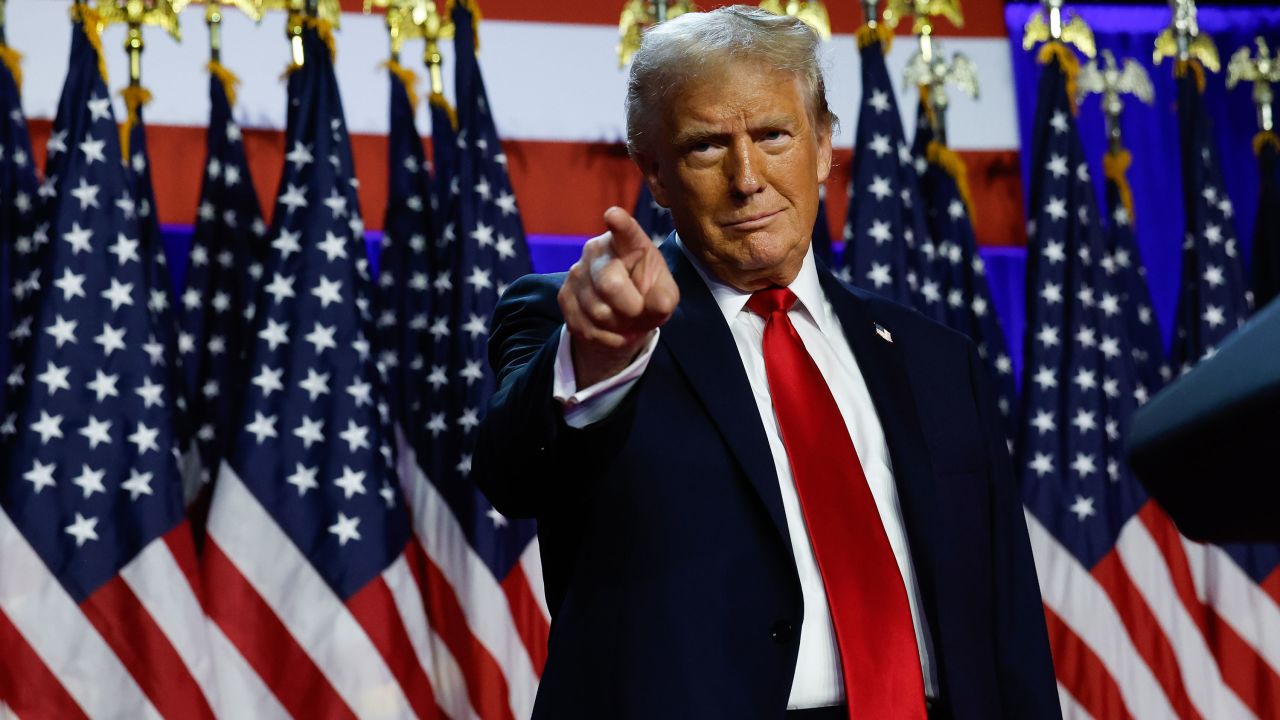Trump secures victory in the 2024 presidential election.

Donald Trump achieved a significant victory to reclaim the White House following an unconventional campaign.
Former U.S. President Donald Trump, the Republican presidential nominee, responds on stage alongside former first lady Melania Trump during an election night event at the Palm Beach Convention Center on November 06, 2024, in West Palm Beach, Florida.
Following forecasts of a closely contested election and an extended vote tally, Donald Trump achieved a decisive victory, reclaiming the White House after an unconventional campaign.
Below are the essential insights from the Republican election victory on Tuesday: Clear victory Upon Trump’s victory in 2016, many of his adversaries contended that it was an anomaly, attributing it to the Democrats’ overconfidence and the peculiarities of the US electoral system.
This time is different. As the counting of results continued on Wednesday, Trump maintained a lead in every state that President Joe Biden had previously flipped from the Republican camp four years prior, with rival Kamala Harris failing to achieve any unexpected victories.
Initial signs suggested that Trump was poised to secure not only the state-by-state Electoral College necessary for the presidency but also the popular vote, marking the first occasion a Republican would achieve a majority in total votes nationwide since George W.
Bush two decades prior. In anticipation of the upcoming election, the Supreme Court made a decision to protect Trump from prosecution regarding official actions, thereby averting a trial related to his encouragement of supporters who violently stormed the US Capitol after his 2020 loss.
Expanding the Republican constituency Trump made progress by securing a larger share of Black and Hispanic voters, demographics traditionally viewed as strong supporters of the Democrats, although he did not achieve a majority in either category.
According to an NBC News exit poll, Trump secured 45 percent of Hispanic voters and 12 percent of Black voters, in contrast to the 32 percent of Hispanics and eight percent of Blacks in 2020.
The transition was notably pronounced along gender lines, as evidenced by the exit poll indicating that a majority of Hispanic men and 20 percent of Black men cast their votes for Trump this election cycle.
Despite not securing a majority in either group. According to an NBC News exit poll, Trump secured 45 percent of Hispanic voters and 12 percent of Black voters, in contrast to 32 percent of Hispanics and eight percent of Blacks in 2020.
The change was notably pronounced along gender lines, as evidenced by the exit poll indicating that a majority of Hispanic men and 20 percent of Black men cast their votes for Trump this election cycle.
Promotional Content Demonstrating significant appeal among Latino voters, Trump achieved a historic milestone by becoming the first Republican to secure victory in Miami-Dade County since 1988, as well as the first to win Texas’s predominantly Hispanic Starr County on the Mexican border since the 19th century.
“The Republican coalition is robust and has seen significant expansion,” stated Julian Zelizer, a professor at Princeton University.
His strength against Harris — who was poised to be the first woman and second Black president — emerged despite Trump’s calls for mass deportation of undocumented immigrants and derogatory remarks aimed at Puerto Rico during one of his closing rallies.
Exit polls indicated that economic issues played a significant role, as voters expressed ongoing concerns regarding inflation.
Expedited campaign for Harris Harris commenced her campaign in July after Biden withdrew from the race amid growing concerns regarding his age.
During a closing rally one week prior to the election, she recognized that this campaign was not conventional and noted that numerous voters are still becoming acquainted with her identity.
Speculation quickly arose regarding whether an earlier departure by Biden could have enhanced Harris’s prospects — or if he himself would have performed more favorably.
Harris successfully cultivated a passionate support base and outperformed Trump in fundraising, facilitating an effective ground operation to mobilize voters.
White House, not courthouse.
Harris has consistently highlighted concerns regarding the potential threat to democracy posed by Trump, who faced impeachment on two occasions during his first term and is set to become the first president to hold a felony conviction.
Voters dismissed any apprehension regarding the ongoing legal matters involving Trump, including special counsel Jack Smith’s investigation into Trump’s attempts to overturn the 2020 election results and his handling of classified documents during his time out of office. With his return, Trump is likely to make efforts to halt the legal cases against him.
His supporters have contemplated retribution against Smith and others who have opposed him.









